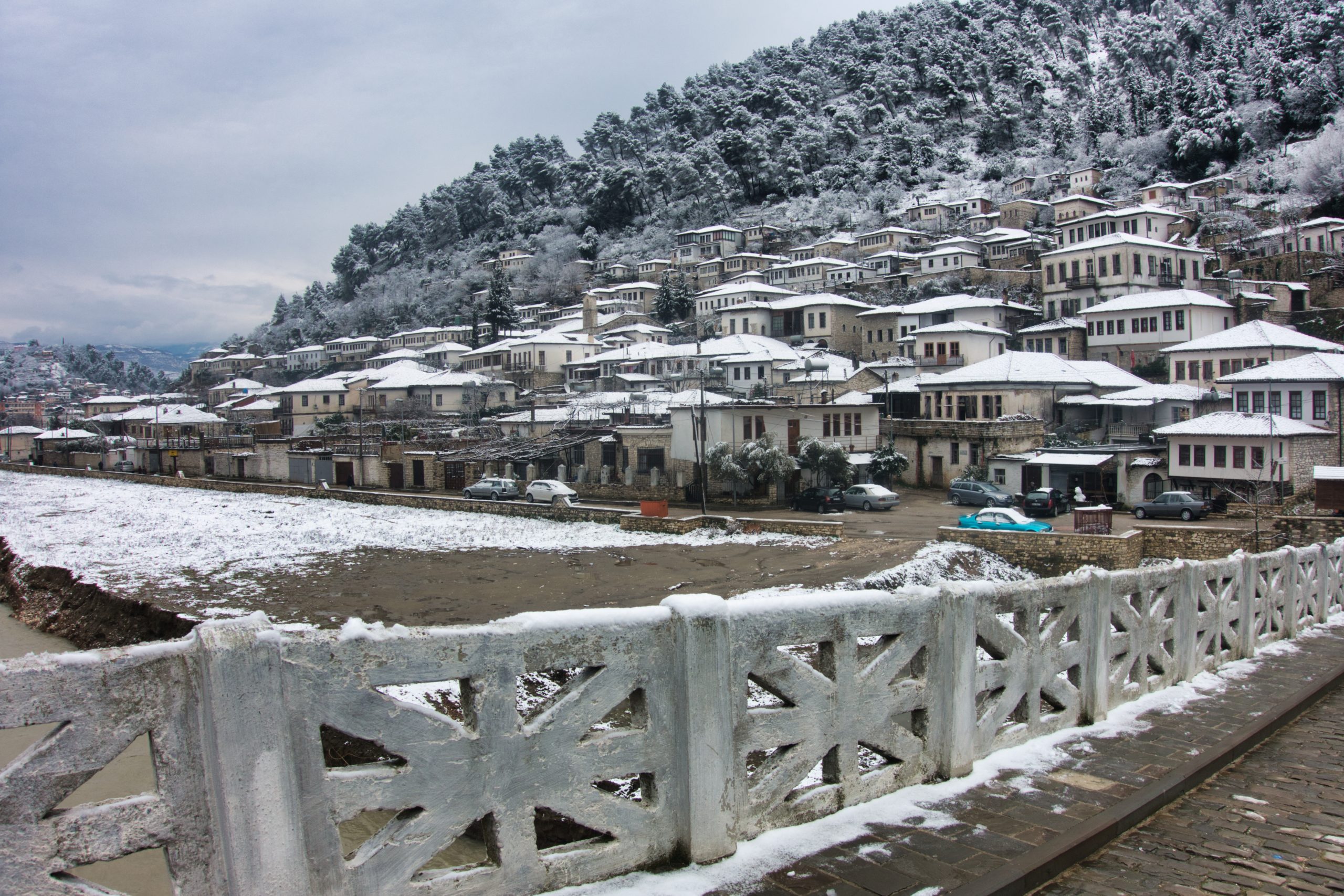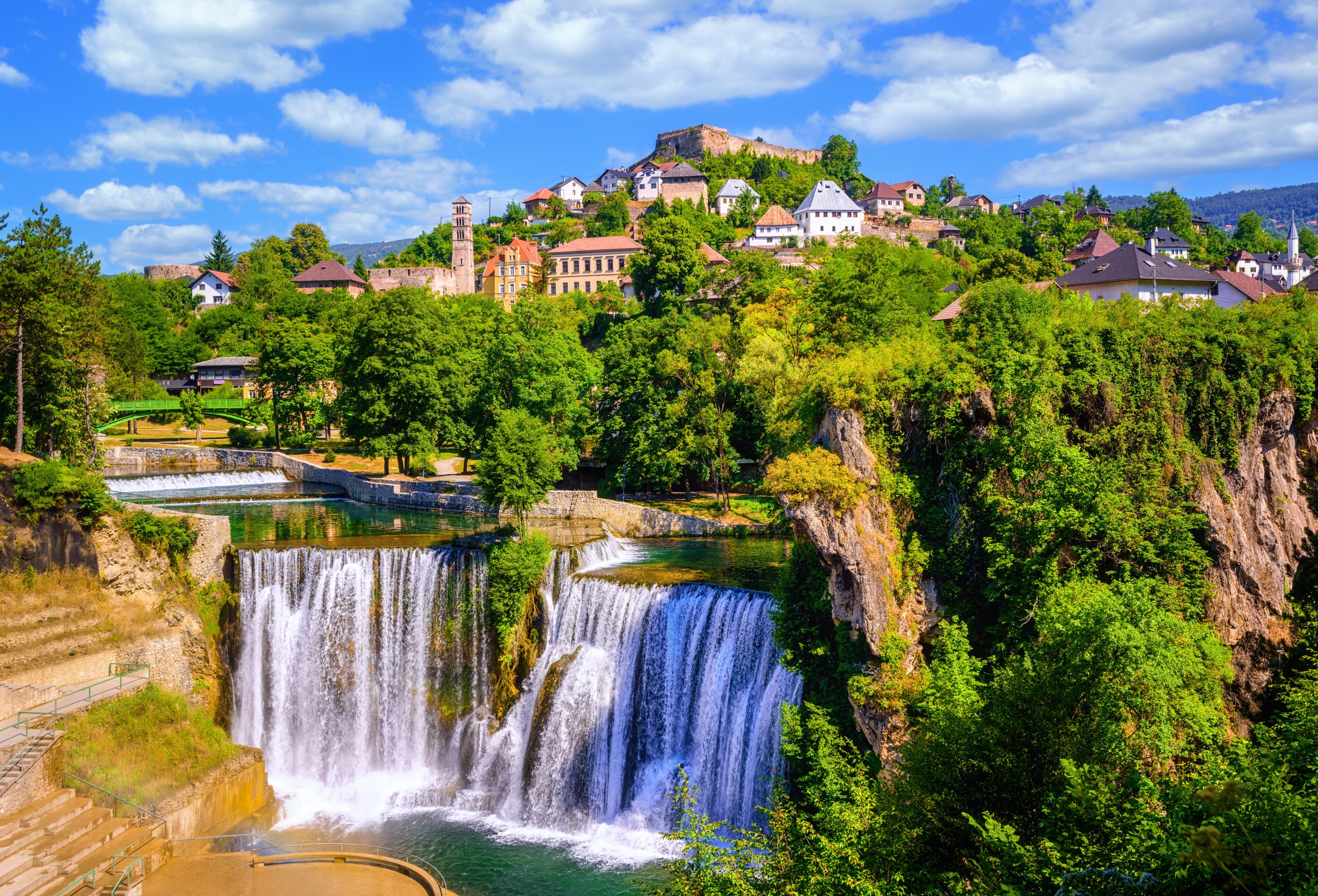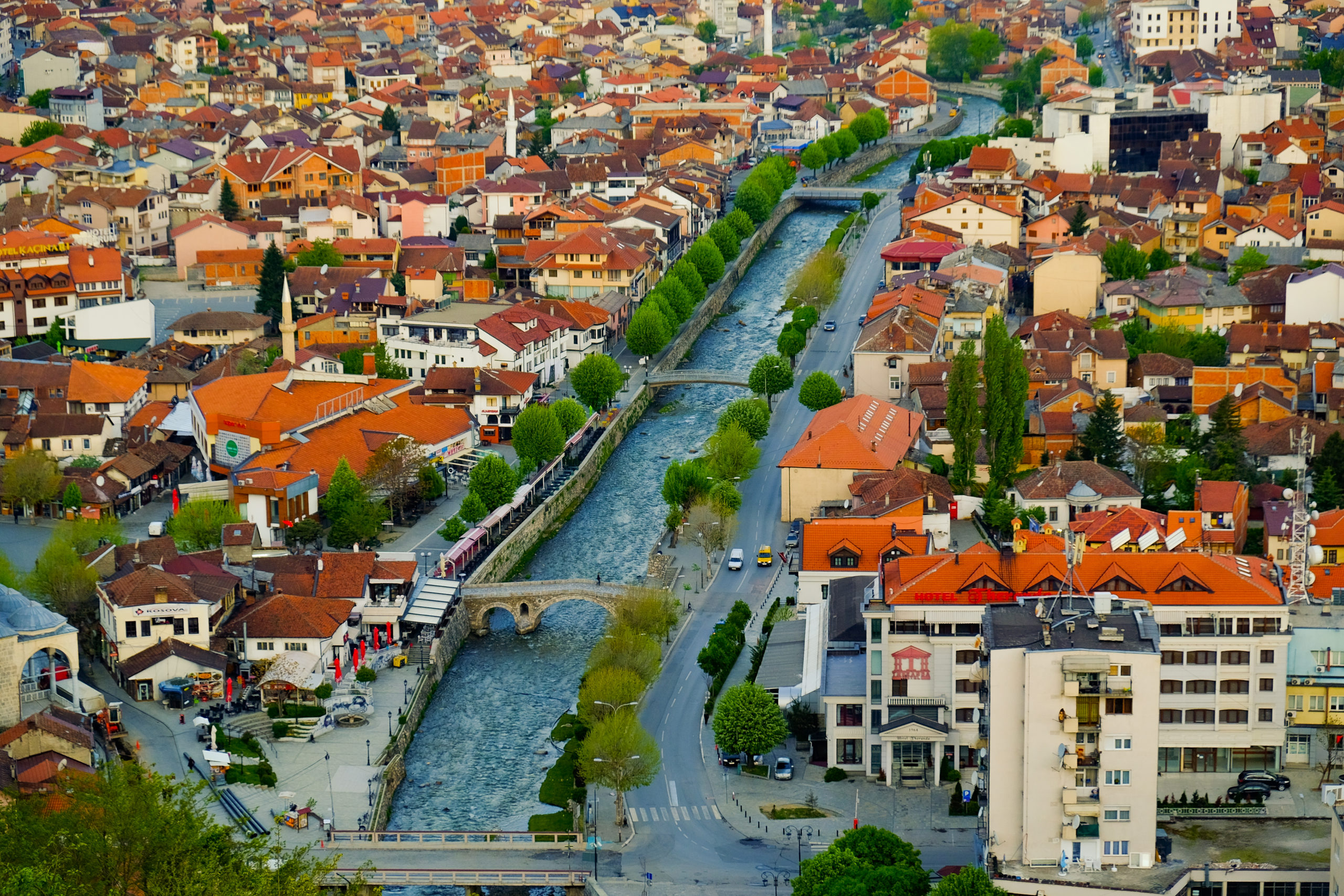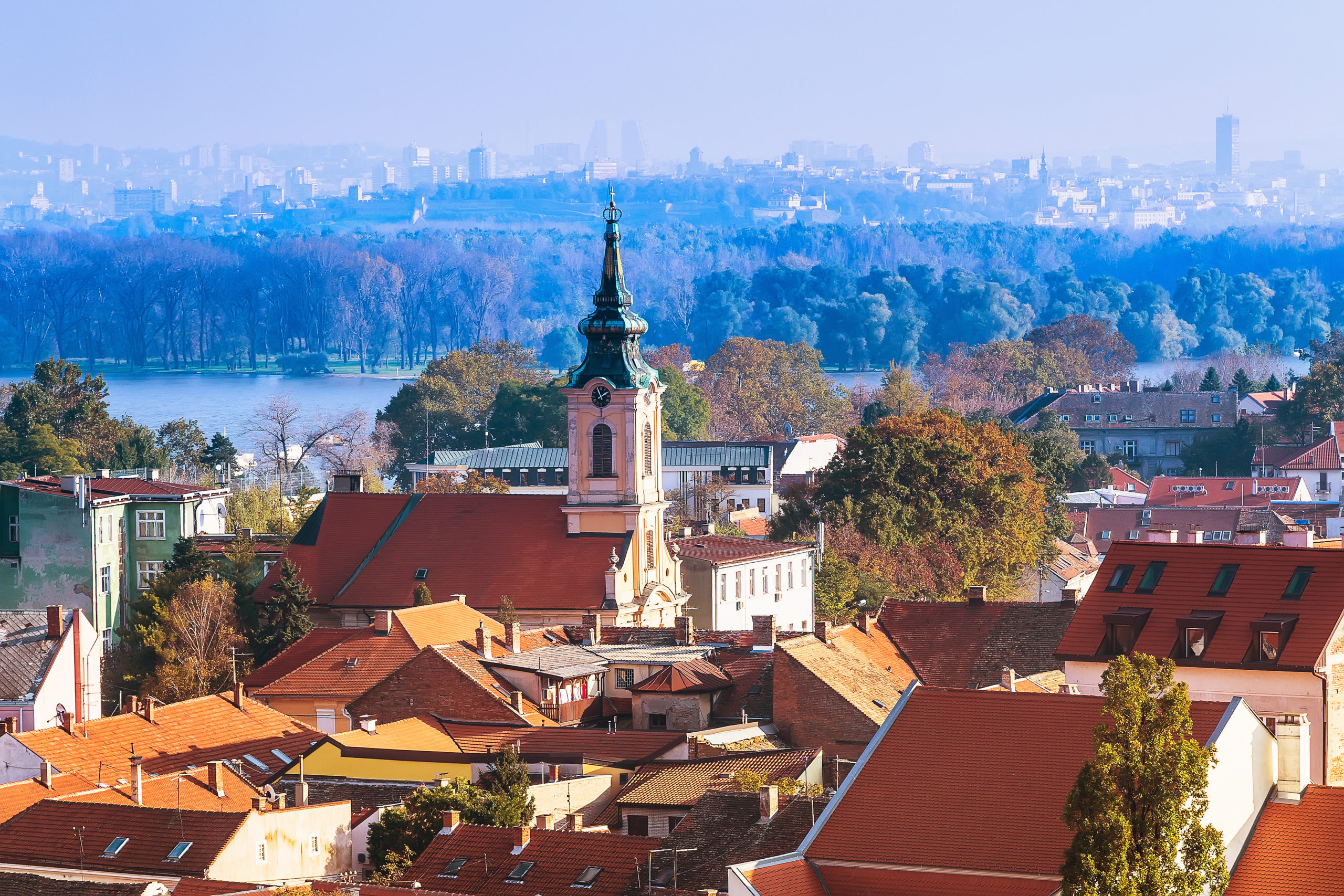Strategic Analysis Balkan Brief
Second half of November 2023
Petra Bošková, Lýdia Chobotová,Matej Jadroň, Chiara Mihlačatinová, Sára Gregová, Dominik Boris, Aneta Migátová

Berat, Albania. Photo: Shutterstock.com
Albania
European Court Holds Albania Accountable for Fatalities at 2011 Protest
The European Court of Human Rights (ECHR) determined that the Albanian Government is accountable for the National Guard’s gunfire that resulted in three casualties during opposition protests in the year 2011. The court also highlighted the inadequate investigation into their deaths by the authorities.
On November 12, ECHR ruled in favour of the family members of one of the three individuals fatally shot during the 2011 demonstration outside the office of then-Prime Minister Sali Berisha in Tirana. The family members claimed that the head of the National Guard, responsible for safeguarding the prime minister’s office, had instructed his personnel to use force against the protesters.
The court determined that there were breaches of the right to life and the right to an investigation as per the European Convention on Human Rights.
The judgment highlighted deficiencies in the authorities’ response to the incident, raising doubts about their commitment to an unbiased investigation. The investigation failed to address the issue of potential command responsibility. Instead, it concentrated on the individual accountability of National Guard officers, neglecting to scrutinise the sequence or nature of any orders issued by those higher up in their chain of command. The court deemed the investigation ineffective, failing to uncover the truth or hold those responsible accountable.
The court also noted that even though the national courts had found the state responsible and relatives had received compensation, the circumstances of the shooting remain unclear.
Additionally, the court noted that the authorities failed to demonstrate that the National Guard officers’ use of lethal force, leading to the death of the applicant’s relative, was necessary. The Albanian Government acknowledged that the use of force was excessive.
The demonstration was orchestrated by the Albanian Socialist Party, the primary opposition faction during that period, in opposition to the Government led by Berisha, who served as prime minister from 2005 to 2013. Berisha denied any accountability, characterising the protest as an attempted “coup” against the state.
Sources:
- EHCR, „Judgment concerning Albania,“ https://www.echr.coe.int/w/judgment-concerning-albania-3
- Sinoruka, Fjori. Balkan Insight, „European Court Finds Albania Responsible for Deaths at 2011 Protest,“https://balkaninsight.com/2023/11/14/european-court-finds-albania-responsible-for-deaths-at-2011-protest/
Bosnia and Herzegovina
NATO Secretary General in Sarajevo
During his visit across the Western Balkans, NATO Secretary-General Jens Stoltenberg visited Bosnia and Herzegovina on November 19 – 20, 2023. During his stay in Sarajevo, he held several meetings with local political leaders. He also visited NATO Headquarters in Sarajevo, where he met Commander of the Headquarters Brigadier General Pamela McGaha and NATO staff and thanked him for supporting peace and stability in the country.
During a press conference with the Chairperson of the Council of Ministers of Bosnia and Herzegovina, Borjana Kristo, he expressed concern about the secessionist actions of Republika Srpska under President Milorad Dodik. “Allies strongly support the sovereignty and territorial integrity of your country. We are concerned about secessionist and divisive rhetoric and external influence, especially from Russia,” said Stoltenberg. “This threatens to undermine stability and hampers reforms.” He called on political leaders to work together, which is essential for building national institutions and achieving coherence. In response to the Secretary-General’s statement, the Embassy of the Russian Federation in BiH stated: “On the one hand, he (Mr Stoltenberg) speaks about the destabilising influence of Russia. On the other hand, it welcomes the unanimous decision of the UN Security Council to extend the Althea mission, which it sees as a stabilising factor. As is well known, Russia supported this decision in principle.”
Secretary-General also said that NATO is considering strengthening its presence in Bosnia and Herzegovina and Kosovo so that the violence does not get out of hand and cause further friction and possible conflicts.
Mr Stoltenberg also met with members of the BiH Presidency. Denis Bećirović, member of the Presidency of Bosnia and Herzegovina, thanked the Secretary-General for his support in the country’s efforts to join NATO and the EU. Becirovic said that the country is ready to contribute to stability and security in the region and the whole world.
During the visit, the Secretary-General also met with High Representative Christian Schmidt. During a joint press conference, the High Representative pointed out the necessity of a functioning state to complete NATO’s and the EU’s accession process. He pointed to the problems that exist in the country, such as corruption and political instability. The Secretary-General highlighted the work of the High Representative and the excellent cooperation with his office. “We want to see a peaceful country at the heart of a stable region, and your efforts as High Representative are vital to the unity and the reconciliation of this country,” he said.
Sources:
- NATO, “NATO Secretary General underscores importance of stability in the Western Balkans at the start of his visit to the region “, https://www.nato.int/cps/en/natohq/news_220279.htm
- AP News, “NATO chief commits to Bosnia’s territorial integrity and condemns ‘malign’ Russian influence“, https://apnews.com/article/nato-bosnia-balkans-russia-serbia-6d5045020546205382481081a12bbee7
- Sarajevo Times, “Russian Embassy in BiH reacted after Statement by NATO Secretary General Jens Stoltenberg “, https://sarajevotimes.com/russian-embassy-in-bih-reacted-after-statement-by-nato-secretary-general-jens-stoltenberg/

Jajce, Bosnia and Herzegovina. Photo: Shutterstock.com
Croatia
Mutual Expulsion of Diplomats Between Croatia and Serbia: A Threat to Regional Stability?
In an action that has strained the relationship between the two Balkan neighbours, on November 21, Zagreb expelled the Serbian diplomat Petar Novaković. This comes as a reciprocal response to Serbia’s earlier expulsion of the Croatian diplomat Hrvoje Šnajder. The unexpected expulsion of Šnajder was announced by Serbia without providing specific reasons.
Belgrade declared Croatian diplomat Hrvoje Šnajder, who serves as the First Secretary of the Croatian embassy in Serbia, persona non grata. Serbia’s Foreign Ministry stated that during his professional tenure in Serbia, Šnajder significantly deviated from the framework of diplomatic norms and violated the Vienna Convention. However, it did not provide any details regarding the alleged violation committed by the Croatian diplomat.
The reasons behind Serbia’s initial expulsion of the Croatian diplomat remain unclear. However, media aligned with the populist Serbian Government reported that Šnajder was accused of engaging in “spying activities” and “recruiting” individuals for Croatian secret services.
The Croatian Ministry of Foreign and European Affairs rejected the grounds for Šnajder’s expulsion. As a reciprocal action, Zagreb expelled a Serbian diplomat. Zagreb decided that Petar Novaković, the adviser of the Embassy of Serbia in Croatia, should be declared persona non grata in Croatia.
Zagreb criticised Serbia’s action, stating that it would weaken bilateral relations between the two countries. Additionally, Croatian officials emphasised the potential for further destabilisation in sensitive regional political and security contexts, underscoring the critical importance of stability in Southeast Europe for the entire continent.
Zagreb also claimed that this action is connected to the upcoming parliamentary elections in Serbia scheduled for December 17. It asserted that the expulsion adds additional pressure on the staff of the Croatian embassy in Belgrade, a situation that becomes particularly evident during the pre-election period in Serbia.
The expulsion occurred following a phase in which relations between the two countries had experienced some improvement. This positive shift took place after the initiative of leaders representing Serbs in Croatia and Croats in Serbia, Milorad Pupovac and Tomislav Zigmanov, who worked towards building bridges between officials of the two nations. As a result of their efforts, high-level meetings between the Croatian prime minister Andrej Plenkovic and his Serbian counterpart Ana Brnabic, as well as with the Serbian president Aleksandar Vucic, took place. Nevertheless, this incident could trigger a setback in the relations.
The relationship between Serbia and Croatia is tarnished by their wartime animosity and the unresolved matter of missing persons from the 1991-95 conflict. Additionally, the two nations have not yet settled a non-war-related border dispute. They disagree on whether the border between them follows the course down the middle of the Danube river or along its banks.
Sources:
- Milica Stojanovic et al., Balkan Insight. „Serbia’s Expulsion of Croatian Diplomat Damages Relations: Zagreb“, https://balkaninsight.com/2023/11/21/serbias-expulsion-of-croatian-diplomat-damages-relations-zagreb/
- Milica Stojanovic, Balkan Insight. „Territory, Energy, Politics: Serbia’s Long-Running Border Disputes“, https://balkaninsight.com/2020/03/04/territory-energy-politics-serbias-long-running-border-disputes/
- AP News, „Serbia and Croatia expel diplomats and further strain relations between the Balkan neighbors“, https://apnews.com/article/serbia-croatia-expulsion-diplomat-tensions-4065d6fbda87a2b776f495c8ad12de8c
Kosovo
Stoltenberg & Rama call for increased presence of NATO mission in Kosovo
From November 19 to 22, 2023, NATO Secretary General Jens Stoltenberg went on a tour across the Western Balkans, where he repeatedly emphasised that NATO is considering increasing its military presence in Kosovo through the KFOR mission due to recent “Banjska attack” back in September. Albanian PM Edi Rama supported Stoltenberg´s position.
“In September, we saw a serious outbreak of violence in northern Kosovo, which raised concerns that a wider conflict could return to the Western Balkans,” Stoltenberg said, after mentioning that 93 KFOR troops were injured during the year 2023 alone. After the Banjska attack, the presence of KFOR was increased by several hundred soldiers, now consisting of over 4,500 troops and additional heavy weaponry. Because of the security concerns Stoltenberg mentioned, NATO is considering increasing KFOR troops permanently to contribute to peacekeeping in Kosovo.
Albanian PM Rama welcomed and supported NATO´s intentions of making the increased presence of KFOR troops permanent, primarily because of the need “to guarantee the borders between Kosovo and Serbia“.Rama also mentioned he asked Stoltenberg to consider deploying KFOR troops along the northern border of Kosovo to handle the “out of control” situation with illegal activity, including arms and narcotics smuggling occurring there. This proposal was also supported by Croatian President Milanovic thus, Stoltenberg promised that NATO would consider this proposal, emphasising that “for two decades, KFOR has guaranteed security and a safe environment for all communities. We will continue to do so impartially under the UN mandate.”
Sources:
- Jelena Nikolić, EURACTIV, “Vučić, Stoltenberg discuss Serbia’s collaboration with NATO, tension in Kosovo”, https://www.euractiv.com/section/politics/news/vucic-stoltenberg-discuss-serbias-collaboration-with-nato-tension-in-kosovo/
- Radio Free Europe, “Stoltenberg Says NATO Considering Making Its Peacekeeping Increase In Balkans Permanent”, https://www.rferl.org/a/nato-stoltenberg-balkans-tour-bosnia-russia-interference/32692304.html
- Radio Free Europe, “Albanian PM Calls For More Significant Increase In NATO Troops In Kosovo”,https://www.rferl.org/a/nato-troops-kosovo-prime-minister-rama-serbia/32695786.html

Prizren, Kosovo. Photo: Shutterstock.com
Montenegro
Is corruption on the rise in Montenegro?
On November 19, Suzana Mugosa, a Higher Court judge, demanded that authorities investigate the Appeal Court’s ruling in a 2021 case against opposition figures accused of complicity in a Russian-backed coup attempt, alleging that the trial’s judges were bought. The sentenced people were convicted of preparing to commit “terrorist acts” and disrupt Montenegro’s constitutional order during parliamentary elections to destabilise the country’s pro-Western administration and prevent it from joining NATO.
To shed light, in May 2019, the Higher Court condemned 13 persons, including Mandic, Knezevic, two Russian military intelligence officials, and eight Serbs, to up to 15 years in prison for plotting a coup. However, they immediately appealed to the Appeal Court, which annulled the verdicts and requested the Higher Court to do a retrial. The revival of the case is taking place now, and its current situation could be best summarised by the words of Mugosa: “I hope that Special State Prosecution will investigate all the circumstances surrounding both Higher Court and Appeal Court decisions because I’m also convinced that the of the Appeal Court’s decision was bought.”
Such development arises only a couple of months after a new report by the Center for Democratic Transition concluded that comprehensive legislation on corruption is not matched with practical enforcement of anti-corruption measures in Montenegro. As a result, the present framework must be enhanced further to meet EU criteria. The study also discovered a favourable trend in the work of the Anti-Corruption Agency, but its independence is still being questioned, both legally and practically.
Montenegro is ranked 65th out of 180 countries in Transparency International’s 2022 Corruption Perceptions Index, being 12 places behind Slovakia. This only reinforces that Montenegro’s corruption problem is severe and needs to be resolved as soon as possible, otherwise, it may jeopardise Montenegro’s membership bid.
Sources:
- Samir Kajosevic. Montenegrin Judges Accused of Bribe-Taking in ‘Coup Plot’ Trial. https://balkaninsight.com/2023/11/21/montenegrin-judges-accused-of-bribe-taking-in-coup-plot-trial/
- UNCA Coalition. New civil society report on montenegro: comprehensive legislation not matched with practical enforcement of anti-corruption measures. https://uncaccoalition.org/uncacparallelreportmontenegro/
North Macedonia
North Macedonia is hosting the 30th Ministerial Council of OSCE
The 30th Ministerial Council of the Organization for Security and Cooperation in Europe (OSCE) commenced in Skopje, North Macedonia, from November 30 to December 1, 2023. With 1,000 participants from 76 delegations representing 57 OSCE member countries, Bujar Osmani, OSCE Chairman and Foreign Minister of North Macedonia, officially initiated the Council. Osmani announced that Malta will assume the rotating presidency in January 2024. Estonia was supposed to take over the presidency in January 2024, but Russia and Belarus vetoed it, arguing that Estonia is a NATO member country. US Secretary of State Antony Blinken praised Malta’s commitment, while UK Foreign Secretary David Cameron emphasised the OSCE’s role in European security. Russian Foreign Minister Sergei Lavrov attended the meeting, too, but Ukraine and Baltic states abstained.
North Macedonia has temporarily suspended a ban on flights from Russia to allow Russian Foreign Minister Sergei Lavrov to attend the OSCE ministerial. Most European countries banned flights from Russia after it invaded Ukraine in February 2022. Except for Moscow’s close ally Belarus, Lavrov has not visited any European country since the start of the war in Ukraine. The head of Russian diplomacy travelled to Turkey, which, like North Macedonia, is a member of NATO but has not imposed a ban on Russian flights. In the United States, Lavrov participated in the proceedings of the UN General Assembly.
In March last year, Lavrov could not fly to Geneva for a UN conference after members of the European Union banned Russian planes from entering their airspace as part of sanctions against Moscow. At the time, the Russian diplomat accused the EU countries of “trying to avoid sincere personal dialogue or direct contacts, which are supposed to help find political solutions to urgent international problems”. Ukraine, Estonia, Latvia, Lithuania, and Poland did not take part in the OSCE meeting in Skopje in protest of Russian Foreign Minister Sergey Lavrov’s attendance. Meanwhile, Josep Borrell, the EU’s foreign policy chief, said he thought Lavrov’s attendance would be a good opportunity for Moscow’s top diplomat to hear from OSCE members “why Russia is being condemned and isolated.” Russia has accused Western countries of trying to block its officials from the meeting, saying that such attempts threaten “the very existence of the organisation.”
Sources:
- Anadolu Ajansi, „North Macedonia hosts 30th Ministerial Council of OSCE” https://www.aa.com.tr/en/europe/north-macedonia-hosts-30th-ministerial-council-of-osce/3069084#
- Hospodarske noviny , “ Severné Macedónsko dočasne pozastaví zákaz letov z Ruska, aby mohol Lavrov prísť na konferenciu OBSE ” https://hnonline.sk/svet/96117297-severne-macedonsko-docasne-pozastavi-zakaz-letov-z-ruska-aby-mohol-lavrov-prist-na-konferenciu-obse
- AP , “ Russia’s foreign minister faces Western critics at security meeting and walks out after speech ”, https://apnews.com/article/russia-ukraine-war-lavrov-osce-54d068fb8eb9e84206b915563632cd60

Old Tower in Belgrade. Photo: Shutterstock. com
Serbia
Where is Serbia heading in the snap elections?
In a significant political move, Serbia’s President, Aleksandar Vučić, has on November 1 announced the dissolution of parliament and the scheduling of early elections. The decision came less than two years after his Serbian Progressive Party (SNS) had won the previous election. The move is seen as an attempt by Vučić to consolidate his authority amidst rising pressure over ties with Kosovo and recent mass shootings.
The early parliamentary and municipal elections are scheduled to take place on December 17, as confirmed at the beginning of November. In addition to electing a new parliament, over 60 municipalities, including the capital Belgrade, will also hold elections. Various political parties and movements have expressed their participation in the upcoming polls, with some forming alliances to increase their chances of winning.
Opposition parties such as the Independence Justice Party, the People’s Movement of Serbia and the Green Left Front/Ne Davimo Beograd have announced a coalition under the banner “Serbia Against Violence” and have agreed to run jointly in parliamentary and municipal elections. The dialogue aims to challenge the ruling party’s dominance, especially right-wing parties that have declared themselves “state-building opposition” and have yet to form a common agreement for the upcoming elections. A fragmented opposition environment could pose challenges to their electoral prospects. However, the opposition received more votes than the ruling party in Belgrade in the previous election, indicating that there could be a shift in voter sentiments in Belgrade.
Serbia’s early elections are crucial for the country’s politics. The ruling party is given the opportunity to reassert its mandate or face a potential challenge from a coordinated opposition.
The decision of Serbian President Aleksandar Vučić to dissolve the parliament and call the snap elections has established an important political agenda. With parties and coalitions vying for power, the upcoming elections could reshape Serbia’s political landscape. As the country gears up for the December 17 elections, all eyes will be on the outcome and its implications for the country’s future direction. The election outcome will determine the future direction of Serbia’s domestic and foreign policies, especially concerning relations with Kosovo and regional stability.
Sources:
- Milica Stojanovic, Balkan Insight, „Serbia Schedules Early Elections for December 17“,https://balkaninsight.com/2023/11/01/serbia-schedules-early-elections-for-december-17/
- Jon Henley, The Guardian, „Serbia’s president dissolves parliament and calls early elections“https://www.theguardian.com/world/2023/nov/01/serbias-president-dissolves-parliament-and-calls-early-election

Contact us